Research and discussion topics
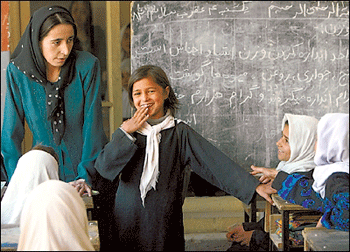
Introduction
The news story suggests lots of interesting topics for discussion and research.
Take a look at those we've picked out from the text. Compare ours with those you found using the methods in Getting the topics.
In groups discuss the differences. This isn't about right or wrong. Your choice is as good as ours as long as you can explain and defend it.
Now have a go at some of the topics - ours or yours.
Selected topics
But nowhere near as many women as men. There never have been.
As pointed out in 2005 by Lawrence Summers, then president of Harvard University
They found a pattern of performance that strongly suggests that social and cultural factors are the main cause of differences in maths performance between males and females.
Math talent is innate; if one is not naturally good at math, there is little one can do to become good at it.
In some other countries, people more highly value mathematics and view math performance as being largely related to effort. Children of immigrants from these countries, girls as well as boys, tend to excel in maths, even while being raised and educated in the US.
The future of the US economy depends on American society doing a better job of identifying and nurturing mathematically talented youth, regardless of gender, race or ethnicity.
Want more?
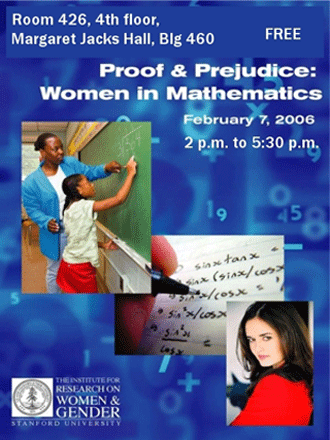
But nowhere near as many women as men. There never have been.
Working in groups choose a female mathematician, living or dead, who interests you.
Research her life and work and put together her story using any medium that appeals - film, poster, PowerPoint, set of still images, illustrated essay, webpage with hyperlinks. Have a go at explaining what her work is about, but don't get bogged down - understanding what pure maths is about at the highest level is a job for other mathematicians.
Depending on your choice of mathematician (and in particular whether she is still alive), think about emailing her and asking if she'd be willing to talk to you about her work, either by email or telephone. Some scientists and mathematicians will talk to school students nowadays, although fewer in maths since it is usually harder to explain cutting-edge maths than science. There is no harm in trying though.
Incidentally include a little explanation of what pure maths means, and what the difference between pure and applied maths is. Why do you think it's called "pure"?
Some of the links from text or photographs in the news story are good places to start your search for someone that appeals. You could also take a look at Agnes Scott College's comprehensive collection of biographies and further resources.
As pointed out in 2005 by Lawrence Summers, then president of Harvard University
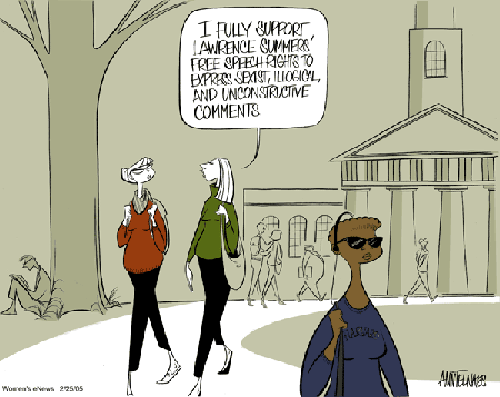
Summers's comments created a storm of protest. Much of the criticism came from people who had not read what he said, but were reacting to what other people claimed he'd said or simply to newspaper headlines. This is always a bad idea.
Let's take a look at what Summers said and try to dig out the science. Here is the transcript of his speech.
It is quite long (over 4000 words not counting questions and answers), so we've picked out some relevant parts. Don't rely on this, though, or you'll be doing what we said in the first paragraph was a bad idea.
Scan the transcript yourself to make sure you've got the relevant parts - and we've got it right. Among other things he said:
"There are three broad hypotheses about the sources of the very substantial disparities ... with respect to the presence of women in high-end scientific professions... the first is what I call the high-powered job hypothesis. The second is what I would call different availability of aptitude at the high end, and the third is what I would call different socialization and patterns of discrimination in a search. And in my own view, their importance probably ranks in exactly the order that I just described."
"It does appear that on many, many different human attributes - height, weight, propensity for criminality, overall IQ, mathematical ability, scientific ability - there is relatively clear evidence that whatever the difference in means - which can be debated - there is a difference in the standard deviation and variability of a male and a female population. "
"So my sense is that the unfortunate truth - I would far prefer to believe something else, because it would be easier to address what is surely a serious social problem if something else were true - is that the combination of the high-powered job hypothesis and the differing variances probably explains a fair amount of this problem."
[More help with words: tentative, prediction, experiment, culture]
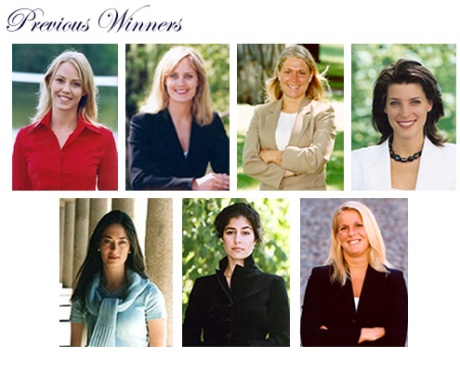
So your first task, working in groups is to look at the speech, find out what Summers means by the "high-powered job hypothesis", and explain it to your colleagues and teacher.
Your second task is to look at what he calls "different availability of aptitude at the high end". In the news story itself this is called the greater male variability hypothesis.
Have a search on this phrase and, working in your groups, try to put together a simple explanation of what it says, and what the evidence for it is.
Now look at what Summers says are the three broad hypotheses people have suggested to explain the shortage of top female mathematicians:
1) the high-powered job hypothesis
2) the different availability of aptitude at the high end
3) different socialization and patterns of discrimination
Summers believes all three have some effect but 1 more than 2 and 2 more than 3. Which of the three hypotheses do his critics believe is the most important?
Finally although we just assumed that "the different availability of aptitude at the high end" and "the greater male variability hypothesis" are the same thing, there is in fact a vital difference between them.
To see what this is follow one of our links to a pdf file written by one of the researchers in the news story (Janet Hyde). Do a search in this document on "greater male variability" (using the little binocular symbol).
You should find 7 occurrences of the phrase. Read them, paying particular attention to 1, 3, 4, 5 and 6 - and especially 5 and 6.
Now answer this question using words from Hyde's paper: What does Summers's use of the word "aptitude" tell you he is assuming about greater male variability?
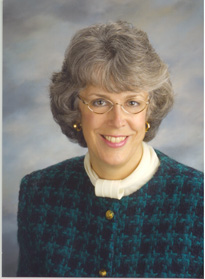
They found a pattern of performance that strongly suggests that social and cultural factors are the main cause of differences in maths performance between males and females.
This new PNAS perspective article by Mertz and Hyde follows up on the paper "Cross-Cultural Analysis of Students with Exceptional Talent in Mathematical Problem Solving," published in the November 2008 Notices of the American Mathematical Society.
Take a look at that paper which is freely available online.
Here is what the authors say about it: "This article presents for the first time a comprehensive compilation of data, including cross-cultural comparisons, regarding young people identified during the past twenty years as possessing profound aptitude for mathematics based upon their performances in extremely difficult examinations in mathematical problem solving."
[More help with words:culture]
In your groups, put together a simpler sentence that says more or less the same thing.
Now from the article, gather together as many pieces of evidence as you can find that support the hypothesis that "social and cultural factors are the main cause of differences in maths performance between males and females."
In your groups list these and discuss them, thinking in particular about three questions. How well does this piece of evidence support the hypothesis? What questions about this evidence do I still have? How could I answer those questions?
Having done all this try to agree within your group on a list of the pieces of evidence in order from strongest to weakest. Decide also on one question that your group still has and how you might set about finding the answer.
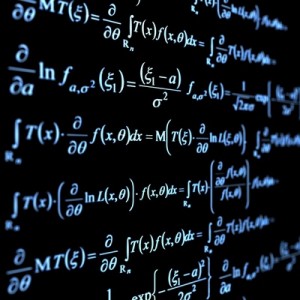
Math talent is innate; if one is not naturally good at math, there is little one can do to become good at it.
It's hard to argue with this statement, especially for those of us who've studied maths after school, as part of a science degree.
Mixing with real mathematicians can be scary. They can do things, see things and understand things that are way beyond the rest of us, even those who are "good at maths".
In your goups do some research on the Indian mathematician Ramanujan who, without any training in mathematics, made many startling discoveries.
You can find information online, but the best source is a marvellous little book called A Mathematician's Apology, by Cambridge mathematician GH Hardy who "discovered" Ramanujan. This book also helps non-mathematicians to understand what mathematicians are and how they think.
Roger Penrose is also a great communicator of the way mathematicians work and think.
In some other countries, people more highly value mathematics and view math performance as being largely related to effort. Children of immigrants from these countries, girls as well as boys, tend to excel in maths, even while being raised and educated in the US.
But becoming really good at anything takes 10,000 hours of practice according to one writer, who has looked at examples of success from many different fields.
Talent is only the starting point, he says. The big difference between you and me, on the one hand, and Tiger Woods, Venus Williams and Stephen Hendry on the other is that they have put in 4-6 hours practice a day for 10 years.
If this is true where does talent come in?
Well it gives you the self-belief and the motivation to put in the long hours of practice. So the really interesting question is this: Could someone who doesn't show much talent in a particular field become superb at it simply by putting in the hours?
Why not test the theory by picking something you want to be great at but aren't and doing the 10,000 hours. Then come back and tell us how you got on.
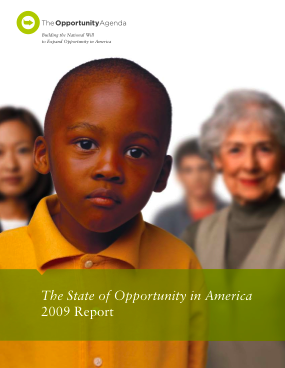
The future of the US economy depends on American society doing a better job of identifying and nurturing mathematically talented youth, regardless of gender, race or ethnicity.
It is often assumed nowadays that countries that do well economically "do a better job of identifying and nurturing" scientifically and mathematically talented youth.
But it's not obvious that more mathematicians studying elliptic cohomology, noncommutative geometry or gauge-theoretic invariants of smooth manifolds - to take just a selection of research topics in pure maths at Glasgow University - are just what we need to get us out of the present recession.
It might seem more likely that greater numbers of applied scientists, mathematicians and engineers would benefit a country's economy. But as it stand this is a hypothesis, not a fact.
Do a bit of research online and see if you can find any evidence to support the hypothesis.
Useful words to get you started are "key factors" "economic" "success" "science" "engineering". Try a few combinations, do a bit of reading and present your findings to the class.
Want more?
1. Here's a summary of the conclusions and recommendations from Cross-Cultural Analysis of Students with Exceptional Talent in Mathematical Problem Solving:
Take a look at the paper itself for the complete version.
a) "First and foremost, the myth that females cannot excel in mathematics must be put to rest. Teachers, guidance counselors, parents, principals, university presidents, the lay public, and, most importantly, girls themselves need to be informed about the fact that females can excel in mathematics, even at the very highest level.
b) We need to improve greatly the lay public’s perception of mathematicians via the news media, movies, and TV shows ... so preteens and teenagers of both genders will feel it is socially acceptable to study and to enjoy doing mathematics. ... Girls, especially, must be made aware that mathematicians do important, interesting work, and most of them are not nerds.
c) Mathematics courses should be taught starting in sixth or seventh grade at the latest by mathematics-certified teachers who majored in the field.
d) There need to exist many more schools such as the Thomas Jefferson High School for Science and Technology ... to provide a socially and academically supportive environment in which mathematically gifted children can pursue their interests with like-minded peers under the mentorship of highly qualified teachers.
e) We should facilitate the ease with which mathematically precocious pre-college students who lack access to programs for gifted children within their own schools can study mathematics above their grade level at local colleges and via correspondence and online programs such as Stanford University’s Education Program for Gifted Youth, Northwestern University’s Center for Talent Development’s Gifted LearningLinks, and the Art of Problem Solving Foundation.
f) We should encourage mathematically gifted children to participate in summer camps such as MathPath®, All Girls/All Math, AwesomeMath, Canada/USA Mathcamp, Hampshire College Summer Studies in Mathematics, Program in Mathematics
for Young Scientists, and the Ross Mathematics Program so they can be exposed to areas of mathematics not currently taught in USA high schools and get to know other children who share their enjoyment of mathematics.
"Yes, some of these proposals cost money," they conclude. "However, there will be a far greater cost to the future of the USA economy and our standard of living if we fail to nurture and develop the talents of the vast majority of our mathematically gifted
children, boys as well as girls."
2) More dumbells but more Nobels
3) Summers's response to the furore following his speech.
4) Gender equity teacher resources
5) The Association for Women in Mathematics
6) Science of gender debate
7) Real maths

